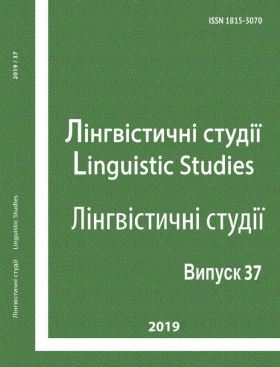Методичні принципи навчання фонології англійської мови в процесі слухання.
DOI:
https://doi.org/10.31558/1815-3070.2019.37.19Ключові слова:
фонологічний аспект англійського мовлення, методичні принципи, психофізіологічні закониАнотація
Розроблено методичні принципи навчання фонологічного аспекту англійського мовлення під час слухання. Науковою основою для визначення зазначених принципів є висновки психоакустичних досліджень, які пояснюють психофізіологічну природу механізму сприйняття мовлення. Визначені методичні принципи базуються на ідеї слідування психофізіологічним законам сприйняття при навчанні іншомовного аудіювання.Посилання
Aldoshina, Irina. “Osnovy Psykhoacustiki (Foundations of Psychoacoustic Studies)”, 2000. [ebook] Available at: http://lib100.com/music/osnovi_psihoakustiki/pdf/. Web. 24 Mar. 2019.
Baddeley, Alan. “Working Memory”. Science 255 (1992): 556–559. Print.
Behtereva, Nataliya, and Pavel Bundzen. “Mozgovyye Kody Psikhicheskoy Deyatelnosti (Brain Codes of Mental Activity)”. Leningrad: «Nauka», 1977. Print.
Bingol, Mustafa Azmi, and Behcet Celik. “Listening Comprehension Difficulties Encountered by Students in Second Language Learning Class” Journal of Educational and Instructional Studies in the World 4 (2014): 3–9. Print.
Common European Framework of Reference for Languages. En.wikipedia.org. (2019). [online] Available at: https://en.wikipedia.org/wiki/Common_European_Framework. Web. 24 Mar. 2019.
Field, John. “Listening in the Language Classroom.” Cambridge: Cambridge University Press, 2009. Print.
Gerbier, Emilie, and Gérard Bailly. “Audio-visual Synchronization in Reading while Listening to Texts: Effects on Visual Behavior and Verbal Learning”. Computer Speech and Language 47 (2018): 79–92. Print.
Gilakjani, Abbas Pourhosein, and Mohammad Reza Ahmadi. “Why is Pronunciation so Difficult to Learn?”. English Language Teaching 4 (2001): 74–83. Print.
Harmer, Jeremy. “Listening”. The Practice of English Language Teaching. London: Longman, 2001. 228–233. Print.
Mai, Luu Hoang, and Luu Thi Bich Ngoc. “Enhancing Listening Performance through Schema Construction Activities”. Journal of Language Teaching and Research 5 (2014): 1042–1051. Print.
Nosulenko, Baleriy. Psikhologiya Slukhovogo Vospriyatiya (Psychology of Auditory Perception). Moscow: “Nauka”, 1988. Print.
Rauschenberger, Maria, and Luz Rello. “Towards the Predicatiopn of Dyslexia by a Web-based Game with Musical Elements”. W4A April 0–04 (2017): 1–4. [online] Available at: https://www.researchgate.net/publication/31428 1580_Towards_the_Prediction_of_Dyslexia_by_a_Web-based_Game_with_Musical_Elements Web. 24 Mar. 2019.
Rello, Luz, and Miguel Ballesteros. Dytective: Diagnosing Risk of Dyslexia with a Game. [ebook] Available at: https://blog.changedyslexia.org/wp-content/uploads/2017/03/PerHealth2016-Dytective.pdf. Web. 24 Mar. 2019.
Rivers, Wilga M. Teaching Foreign Language Skills. Listening Comprehension. Chicago and London: The University of Chicago Press, 1998. Print.
Vandergift, Larry. “Facilitating Second Language Listening Comprehension: Acquiring Successful Strategies”. ELT Journal 53/3 (1999): 168–171. Print.
Velichkovskiy, Boris, and Vladimir Zinchenko. Psikhologiya Vosproyatiya (Psychology of Perception). Moscow: Izdatelstvo Moskovskogo Universiteta, 1973. Print.
Vos de, Rick, and Maarten Hornikx. “Acoustic Properties of Tongue Clicks used for Human Echolocation”. Acta Acustica united with Acustica 103 (2017): 1106–1115. Print.


